- Home
- Articles
- Global Citizen
- Vanuatu Citizenship by Investment: The Ultimate Guide
Vanuatu Citizenship by Investment: The Ultimate Guide
May 15, 2025
As a tropical archipelago in the South Pacific, Vanuatu is many people’s idea of paradise.
Remote and relatively untouched by Western influences, it offers a more raw, authentic and appealing island experience to anyone seeking culture over commercialisation.
But Vanuatu isn’t just about turquoise waters and traditional villages. It also stands out for its citizenship-by-investment (CBI) program, which has attracted interest from global investors and nomads alike.
Despite its reputation as an offshore tax haven, Vanuatu has struggled to establish its CBI program.
One of the key issues is a lack of clear, easily accessible, up-to-date information on how Vanuatu’s CBI program actually works. With multiple versions, previous failed schemes, and inconsistent government communication, the CBI scheme here is arguably one of the most confusing on the market.
And that’s a shame because the potential for a great scheme is there. Vanuatu offers tax-free status, and its passport grants visa-free, visa-on-arrival or eTA access to 97 countries, including destinations like Hong Kong, Singapore and Russia.
Be warned, though: as of 2025, Vanuatu passport holders no longer have visa-free access to Schengen area countries. Hong Kong and Singapore remain on the list, but access to Russia has fluctuated depending on geopolitics, so it’s important to check this regularly.
Interest has surged in recent years as more people look at alternative citizenship options. But confusion still holds many people back, so the Nomad Capitalist team has put together this comprehensive guide to show how the program works, demystify its most confusing rules and outline the steps to obtain Vanuatu citizenship by investment legally.
Citizenship by Investment: The Basics
Countries all around the world have set up citizenship by investment (CBI) programs that allow people to obtain a second citizenship and passport in exchange for a financial commitment.
Investments come in many shapes and sizes but typically include government bonds, real estate or putting funds into specific industries. You can learn more about what citizenship by investment is and how it works here.
Why Vanuatu?
In terms of what’s special about Vanuatu and its passport, there are some good things going for it.
For starters, it’s one of two CBI programs in the Pacific region – but it comes out favourably when you compare it to its geographical rival, Nauru.
Aside from that, the other big selling point is its remoteness. We’re pretty sure that if you looked up ‘middle of nowhere’, Vanuatu would show up. Although it’s a relatively short flight away from Brisbane, Sydney and Auckland, it’s extremely far from the rest of the world.
Now, what Vanuatu has done is capitalise on its location, making it its greatest asset.
The country is consistently rated as the ‘Happiest Country on Earth’ – probably having to do with two things: its off-the-radar location that lets you escape all the world’s troubles, as well as its pristine nature.
Vanuatu’s population of approximately 300,000 citizens live in a country with extremely pure air, water and food – some of the hottest commodities in today’s world.
Vanuatu has a very young workforce, with a median age of just 21.5 – there’s a lot of potential there. It’s also part of the Commonwealth, which means Vanuatu’s citizens get extra rights in the UK due to its historical ties.
Its official languages are English, French and Bislama, but the really interesting fact is that Vanuatu has the highest density of languages per capita in the world, with over 100 native languages and dialects spoken across its islands.
Vanuatu’s climate is tropical, and for three-quarters of the year, the weather is hot and humid.
Its setting means that tropical storms are frequent, and its volcanic origin makes the archipelago vulnerable to earthquakes. Fortunately, the islands are well-prepared for these acts of nature.
Vanuatu’s Economy
Although Vanuatu has been independent since 1980, its story has yet to be written. Just like any other island nation, Vanuatu suffers from its over-reliance on just a handful of industries.
Traditionally, the four main pillars of Vanuatu’s economy have been agriculture, tourism, offshore financial services, and beef exports.
Cue CBI, which has become a major source of government revenue in recent years.
For example, after peaking in contributions between 2019 and 2021, when revenues often exceeded 40% of the total, the CBI program still brings in a substantial portion of its income.
In 2022, CBI revenue was about US$71 million, accounting for around 29% of total government revenue, with analyses indicating it contributed up to 50% in that year, acting as an economic buffer through natural disasters and the post-Covid recovery phase.
This trend continued into 2023, with the programs generating approximately US$68 million, accounting for around 21.8% of government revenue.
In the first half of 2024, CBI income was US$28 million, representing an average of 18% of government revenue during that period.
Steady growth like this means you can rest assured that the carpet won’t be pulled from under investors’ feet. The government fully recognises just how important the citizenship program is to develop Vanuatu’s economy and how instrumental it will be for its further growth.
Factors such as the EU’s suspension of visa-waiver privileges in 2022 due to concerns over the CBI schemes have also reduced revenues from their peak levels. However, it is clear that the Vanuatu CBI program has its limitations and cannot continue to expand indefinitely.
Consequently, the country continues looking for new revenue streams and ways to diversify its economy. Fortunately, other essential industries, such as tourism, are also experiencing growth.
Back in 2000, there were only 57,000 visitors to Vanuatu. Now, over 100,000 people visit the islands every year, many of whom come for premier scuba diving opportunities.
Of course, financial services continue to play a major part in Vanuatu’s economy. It has been a long-standing tax haven – the Bahamas of the Pacific, so to speak. Until 2008, Vanuatu didn’t share any information with governments or law enforcement agencies abroad.
However, as the country is affected by external political forces, it has started to implement more transparent practices.
While Vanuatu has made efforts in financial transparency, as of early 2025, it remains on the European Union’s list of non-cooperative jurisdictions for tax purposes. The EU is concerned about Vanuatu allowing offshore structures and arrangements that lack sufficient economic substance and failing to share adequate tax information.
This status can have implications for international banking and transactions, so investors should be aware of it.
All in all, Vanuatu still has a long way to go in terms of tax framework implementation and tax collection itself, but thanks to its CBI program, the economy is definitely not in bad shape.
The Pros of Vanuatu CBI
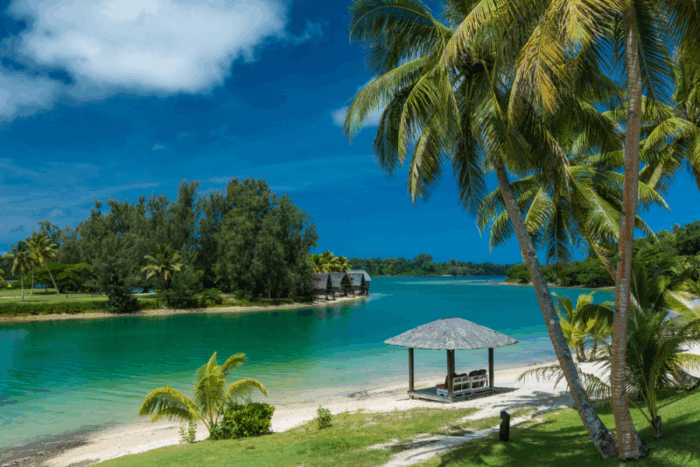
Exploring the merits of Vanuatu’s CBI program reveals an array of benefits for prospective citizens.
To begin, you can expect to receive your passport within two months.
This efficiency is thoughtfully paired with a reduced upfront financial commitment. Unlike other jurisdictions, you’ll only have to pay the full investment price after you get pre-approved for a passport from Vanuatu, making it a less risky proposition.
To top it off, Vanuatu has no personal income tax, no inheritance tax and no capital gains tax. This framework contributes to an internationally business-friendly environment.
Like many CBI programs, it is designed with family inclusivity in mind. The principal applicant can extend the application to include their spouse, all dependent children and even their parents.
Furthermore, this citizenship is hereditary, meaning it can be passed on to descendants, thereby broadening their future opportunities.
For individuals considering relocation or extended stays, Vanuatu is frequently lauded for its high quality of life and has been recognised for its appealing lifestyle.
This idyllic setting also presents further investment avenues, from acquiring a private island to purchasing a beachfront villa, allowing one to experience some of the planet’s most unspoiled natural landscapes.
The Cons of Vanuatu CBI
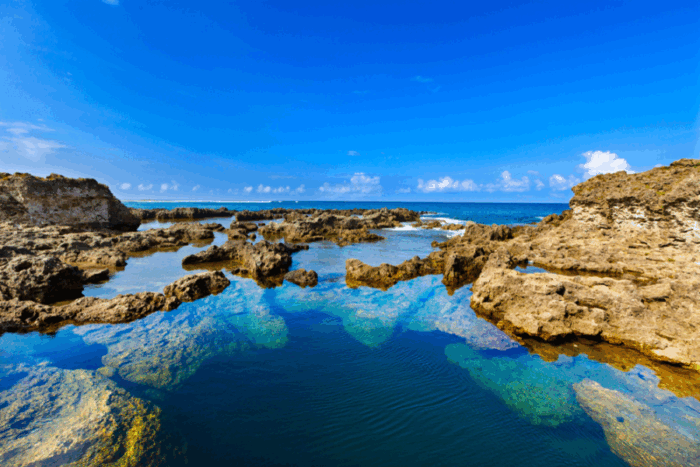
While obtaining Vanuatu citizenship certainly offers many benefits, it’s also wise to look at some potential drawbacks before you decide to apply.
One point to consider is that Vanuatu’s economy leans heavily on its CBI program.
Although the economy isn’t in bad shape, this strong dependence means that if the CBI program were to face serious challenges or a significant downturn, the country’s overall economic stability could be affected.
The legal side of the CBI program can also be too complex to get your head around. Over time, Vanuatu has had several different citizenship programs, and with changes and updates happening, even official government sources might not always be readily up-to-date.
Transparency is another area that warrants attention. In Transparency International’s 2023 Corruption Perception Index, Vanuatu scored 48 out of 100 (where 0 is highly corrupt and 100 is very clean), ranking 61st globally out of 180 countries.
More recent data for the 2024 Index shows an improved score of 50 and a rank of 57th.
While this indicates a positive step, a score of 50 still suggests that perceived public sector corruption is a notable challenge.
The broader Asia-Pacific region, to which Vanuatu belongs, has generally seen slow progress in making major strides against corruption.
Vanuatu’s remoteness is a factor that cuts both ways. For some, its secluded location is a major plus, offering peace and distance from global hubs. For others, especially those not based in nearby Australia or New Zealand, this remoteness could be a practical downside, making travel and access less convenient.
Finally, there’s a key in-person step to complete your citizenship: taking an oath of allegiance. This can’t be done remotely. So, you’ll either need to travel to Vanuatu for the ceremony or cover the significant cost for two government officials to travel to your location, wherever that may be in the world, to administer the oath.
Vanuatu Citizenship by Investment: Options Explained
In the past, figuring out the best way forward meant navigating a maze of different program names and changes.
The good news is that today, while there are still a few routes to choose from, the picture is much clearer.
The Vanuatu Citizenship Office is the main government body overseeing these programs, and it has successfully clarified much of the confusion.
As of early 2025, investors primarily have the following avenues to consider:
Vanuatu Development Support Program
The most well-trodden path is the Development Support Program (DSP), which is basically the main donation route. It was set up in 2017, building on earlier efforts, and involves making a straightforward, non-refundable financial contribution directly to the Vanuatu government.
This money then goes towards funding important infrastructure and aiding recovery in the event of natural disasters.
Vanuatu’s Capital Investment Immigration Plan
Then there’s the Capital Investment Immigration Plan (CIIP).
This is a new set of options for people who want to invest directly in projects or funds that the government has approved.
For example, initiatives like a special Cocoa Fund or a fund supporting coconut oil production.
What makes these CIIP options so appealing is that a portion of your investment might even be returnable after a few years.
Now for a quick but important update on the CIIP. The Vanuatu government decided to take a closer look at these investment streams in early 2025, which meant they temporarily hit pause on accepting new applications for these particular options.
After this review, in April and May 2025, some changes were announced. These included possible increases to some minimum investment amounts, with some suggesting an increase from US$100,000 to US$115,000, with similar changes for families.
They also introduced new reporting requirements for agents handling these investments.
Therefore, if a CIIP pathway sounds interesting, your best bet is to chat with us so we can help guide you on how to do this best.
Vanuatu’s Contribution Program
You might also hear about the Vanuatu Contribution Program (VCP).
It is commonly used as an alternative method for obtaining citizenship by making a monetary contribution, which has mainly been offered to a select group of people, particularly from mainland China.
A Note on Payment Methods
In the past, some of our clients have asked about using cryptocurrencies like Bitcoin to pay for the program.
Some authorised agents were able to help with this, converting the crypto into US dollars for the official payment to the government.
If that’s something you’re considering, it’s really important to check directly with us, as we’ll be able to see if this is still a possibility and if it lines up with all the current rules.
Generally, the Vanuatu government expects to receive the main contributions in traditional currencies like US dollars.
Vanuatu CBI: Investment Amounts
Let’s walk through what you should budget for based on how things look in 2025.
The Development Support Program (DSP)
If this is the route for you, you’ll be making a non-refundable donation to the Vanuatu government.
The amount of this donation changes based on who is applying:
- If you’re applying on your own, the donation is usually US$130,000
- For a couple applying together, it’s generally US$150,000
- If you’re a family of three, you’re looking at around US$165,000
- For a family of four, it’s typically about US$180,000
- Including other children or your parents (if they’re eligible) usually means an extra donation of about US$10,000 to US$15,000 for each one.
The Capital Investment Immigration Plan (CIIP)
The CIIP is a bit different.
Instead of a straight donation, your money goes towards specific investment projects or funds that the Vanuatu government has approved.
With these options, the way the costs are set up can vary.
For example, some CIIP choices might have a total package price for a family of up to four people that comes to around US$160,500.
Another investment example is the CNO Future Fund (for coconut oil), which requires an investment of about US$157,000.
What’s interesting is that some of that money (approximately US$50,000) is an investment that you might even recoup after a few years (typically around 4 or 5 years).
It’s good to know that the Vanuatu government took a fresh look at the CIIP options in early 2025. For a short time, they weren’t accepting new applications for these investment routes, but they have since announced updates and are now accepting new applications.
These new plans aim to raise the minimum investment for some CIIP choices, but not all.
Don’t Forget These Other Costs
No matter which main route you choose, there are a few other standard costs and things to prepare for:
The due diligence fee: You should budget around US$5,500 for important background checks. It usually covers you and several family members on the same application.
There will be some smaller fees: Costs include processing your application, your official Naturalisation Certificate (approximately US$86 per person), and, of course, your new passport.
The government wants to see that you’re in a stable financial position: You’ll generally need to show you have access to funds or own assets worth at least US$250,000. Your agent can tell you exactly what kind of proof they need for this. Bank fees: When moving significant amounts of money across borders, banks often charge a commission, typically around 7% of the amount.
How Does Vanuatu’s CBI Compare?
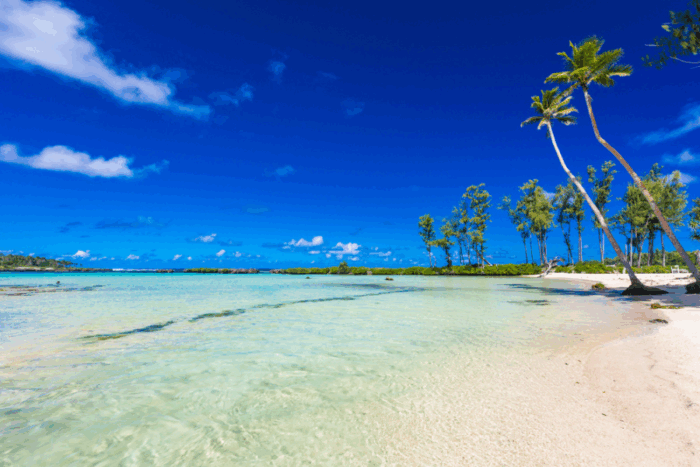
Before you start imagining your new Vanuatu passport, it’s wise to compare it with other CBI programs.
You might have heard that Caribbean programs are the go-to for lower investment amounts. While that was true for a long time, things have shifted a bit.
As of early 2025, many Caribbean nations have updated their programs, and the minimum donation amount for a single applicant or family is now in the US$200,000 to US$250,000 range.
Vanuatu’s main donation option, starting at US$130,000 for a single applicant or around US$180,000 for a family of four, is very competitively priced in today’s market.
However, the well-known programs in the Caribbean are popular for a reason. They provide excellent global mobility, with their passports granting visa-free access to countries including the UK and those in Europe’s Schengen Area.
Many people also look to the Caribbean for tax planning benefits, as these countries often have no income, inheritance, or wealth tax. Additionally, the region offers opportunities to diversify assets or invest in tourism-related real estate.
For those interested in the US, Grenada’s program is unique as its citizens are eligible to apply for the US E-2 Investor Visa, offering a pathway to live and work in the States.
However, apart from its unique location and low cost, Vanuatu’s main advantage over the others is that it’s the fastest way to obtain a second passport.
You could be a proud owner of a brand new passport in just eight weeks’ time. No other CBI program can beat that.
It’s also the only jurisdiction that doesn’t require the total investment sum (or a big part of it) up front. All you have to pay is the US$5,000 fee to initiate the application process and obtain government approval.
Only after that is completed will you be required to pay the rest of the investment sum.
At this stage, it would be unusual for your citizenship not to get approved.
The Step-by-Step Application Process
Before we guide you through the application process, verify you meet the eligibility criteria.
Although the Vanuatu CBI program is pretty liberal, there are some requirements to ensure that you are an applicant of good character and solid financial standing.
These include:
Providing proof of available funds or net assets of at least US$250,000 (the exact nature of this proof, such as bank statements or asset valuations, should be confirmed with an authorised agent)
- Having a clean criminal record
- Being of high standing in your community, society or country
- Not having lived in Iran, Iraq, Syria, North Korea or Yemen for the past five years
- Not being on any sanctions lists worldwide.
If you fulfil all of these requirements, you can apply for the Vanuatu citizenship program.
Here’s how in three simple steps.
1. Get Pre-Approved
The first part of the application process is due diligence. This means submitting your main documents, undergoing a police check, and paying the non-refundable US$5,500 fee for government processing.
Then, you’ll wait approximately one to two weeks for it to be processed. The Financial Intelligence Unit of Vanuatu (FIU) conducts due diligence on the principal applicant and their family members.
If approved, there is a 99% chance you will get your passport.
2. Apply for Citizenship and Wait
Next, you’ll have to gather up all your documents (the list is pretty standard) and submit the full payment.
If all of your paperwork is in order, it will take anywhere between 30 and 60 days for the government to make a decision on your application.
The committee meets twice a month, so it depends on your timing as to how long you’ll have to wait for approval.
3. Take an Oath, Obtain a Passport
Unlike other jurisdictions, Vanuatu requires all its new citizens to attend an oath ceremony, which typically lasts no longer than 30 minutes. That’s the only way a passport can be obtained, so you can’t avoid it.
You have two options for swearing an oath:
- Go to Vanuatu and do it in front of the Commissioner there
- Fly two government officials to a location nearer to your home.
For example, you could meet the officials in a place like London or Dubai. This option obviously involves extra fees, as you must pay for the travel and accommodation of the Vanuatu officials at your nearest Consulate.
The second option might delay your passport issuance, as travel arrangements will need to be made.
Aside from travel arrangements (yours or the government officials, you decide), you will need to pay the additional US$400 fee at this point, which includes US$250 for the passport application, US$50 for the citizenship commission fee and US$100 for certificate fees.
After the ceremony, you will be issued a Naturalisation Certificate, which will allow you to apply for and obtain a passport from Vanuatu.
However, it’s important to note that Vanuatu has been implementing a new passport system since late 2024.
This system requires applicants to provide biometric data (such as fingerprints and facial image) and potentially attend a personal identity verification interview for the issuance of the actual passport book.
Applicants should talk to their agent about how and where these biometric and verification requirements can be met. This might require you to visit Vanuatu or a designated Vanuatu diplomatic mission.
Enjoy Citizenship in Vanuatu Like These Nomad Capitalists
‘Having visa-free transit through Australia and New Zealand with my Vanuatu passport has been a game changer for me living and doing business in Southeast Asia.’
Deshi Luu
‘Applying for my Vanuatu passport was extremely fast, much faster than anywhere else. I’d recommend the passport and Andrew’s exceptional team any time.’
Lewis Wells
‘Vanuatu gives me and my family the Plan B that we have wanted for the longest time. Its location was also a deciding factor for us, it’s incredibly remote and offers full anonymity.’
Chad Richards
Permanent Residence: A Good Alternative
Is getting a passport too much of a hassle? Would you prefer to invest in real estate rather than donate money to a foreign government?
It’s possible to do just that and get a chance to enjoy a tax-free life in Vanuatu.
To qualify for permanent residence in Vanuatu, you must purchase real estate worth at least US$100,000 and have a monthly income of at least US$2,500.
This will allow you to enjoy all the benefits that Vanuatu residency brings, including zero per cent tax, top international schools, clean air and water, pristine beaches and a remote location.
If you spend at least 10 years living in Vanuatu as a permanent resident, you can eventually become a naturalised citizen of the island.
However, if your goal is to acquire citizenship and you would rather not wait a decade, you can always hand over the US$130,000 and get it in a matter of weeks.
Vanuatu Citizenship by Investment: FAQs
No, you don’t need to go to Vanuatu to apply for or receive a passport. You will need to take an oath, but that can be done anywhere in the world for an extra fee.
No. There are no taxes in Vanuatu, only VAT and import duty. That means no income tax, no corporate tax and no inheritance tax.
Yes, Vanuatu recognises dual citizenship, and you will be able to have two, three or more passports and retain your existing citizenship, if you wish.
Yes. Its CBI past is long and complex, and there were and still are multiple programs running concurrently. However, all that investors seeking a second passport need to know is that the minimum investment is US$130,000 plus fees and you can become the owner of a Vanuatu passport.
When we talk about passport rankings or passport strength, the Vanuatu passport is relatively strong. It offers Vanuatu passport holders visa free travel, visa-on-arrival, or electronic travel authorisation access to 97 countries. However, one thing worth noting is that it offers easier access to Commonwealth countries, such as the UK, Australia, Canada and New Zealand.
Yes. Direct family members, including your parents and step-children, can be granted citizenship on your Vanuatu passport application. A Vanuatu citizenship by investment can also be inherited by your future children. Siblings and ‘in-laws’ are not eligible.
At the moment, it’s not possible to purchase real estate and obtain Vanuatu passports, although the government has reportedly been working on a scheme to allow that. You can, however, purchase real estate and become a permanent resident in Vanuatu.
A birth certificate, passport, police certification, resume, proof of address, marriage certificate (if applicable), medical certificate, proof of assets and other bits of paperwork are required. Your agent should be able to help you with all of those. All of the required documents must be in English or be officially translated and certified copies.
Pretty much anyone of good social and economic standing can apply to become a citizen of Vanuatu. You cannot have a criminal background and you must have at least US$250,000 in liquid assets to your name.
For the most part, yes. You will, however, have to send in paper versions of your paperwork and then attend an in-person oath swearing ceremony to receive your citizenship.
It will take anywhere from 8 to 12 weeks to gain Vanuatu citizenship, making it the fastest second passport procedure in the world.
Set Your Sights on Vanuatu Citizenship
Vanuatu might be a gorgeous archipelago in the South Pacific, with a regionally strategic location to boot, but most people know it as an offshore tax haven.
Although tourism has picked up in recent years and its agriculture is doing well, the government predominantly attracts foreign capital by running its citizenship-by-investment program.
While you would think that such a program would be accountable to its stakeholders – from investors to the agents selling it – a persistent lack of transparency has undermined confidence in the system.
We believe that Vanuatu’s current citizenship-by-investment program has tremendous potential. It’s learned from some of the past mistakes by consolidating previous offerings, reducing complex regulations and simplifying pricing and procedures.
However, concerns remain. In particular, the program operated through a single agent based in Hong Kong must either be clarified or phased out to improve transparency and global trust.
What Vanuatu needs above all else is experienced leadership to steer its CBI program towards greater consistency and long-term viability. The government’s 2019 effort to harmonise competing schemes was a step in the right direction – but it was just a beginning.
Still, despite the challenges the program remains an attractive option as a route to second citizenship. Revenues continue to grow and the government is reportedly exploring new options, including a real estate and other direct investment routes, beyond the current donation model.
Only time will tell what comes of those rumours, but if you’re ready to jump in and acquire a Vanuatu citizenship by investment right now, you need an advisor you can trust. The Nomad Capitalist team is here to help. Feel free to reach out.


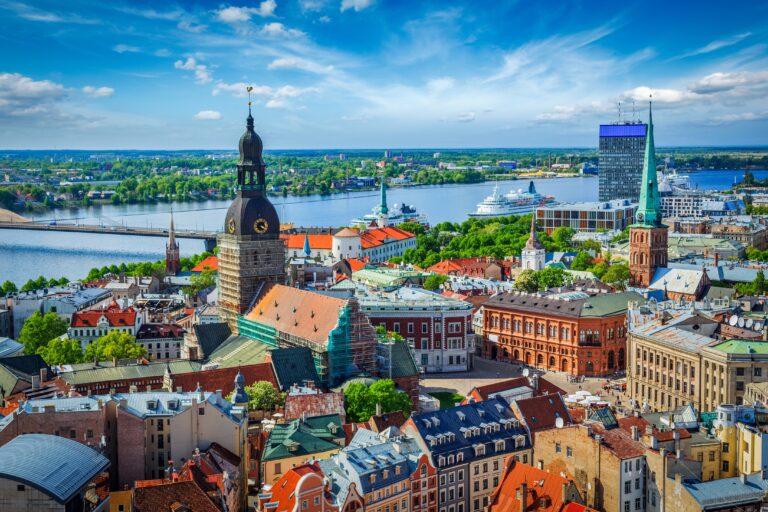
Latvia Real Estate Investment for Expats: Eligibility, Taxes, and Benefits
Purchasing real estate in Latvia is a popular investment strategy for wealthy expats seeking affordable property ownership opportunities that may lead to Latvian residency. The country is known for low investment requirements, minimal restrictions on foreign property ownership, and low property tax rates. In this guide, we will explain the rules for buying Latvia real […]
Read more
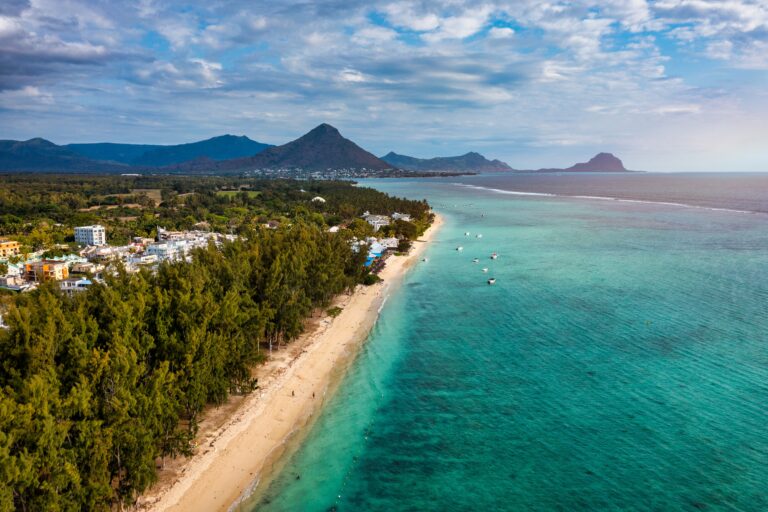
Mauritius Residency Requirements 2026: A Complete Guide
Thanks to its favorable tax policies, political stability, and a relaxed and family-focused lifestyle, Mauritius is one of the premier relocation destinations for high-net-worth individuals. You can get Mauritius residency through one of several residency programs, including those aimed at business and property investors. In this article, we’ll explain the Mauritius residency requirements for each […]
Read more

UAE Golden Visa: Requirements, Application Process, and Advantages Explained
The UAE Golden Visa allows high-net-worth expats to invest, work in, and relocate to the Emirates while benefiting from its zero-tax system and high living standards. There are several paths to the Golden Visa, and understanding which one is right for you can make a significant difference in your residency process. In this guide, we’ll […]
Read more




